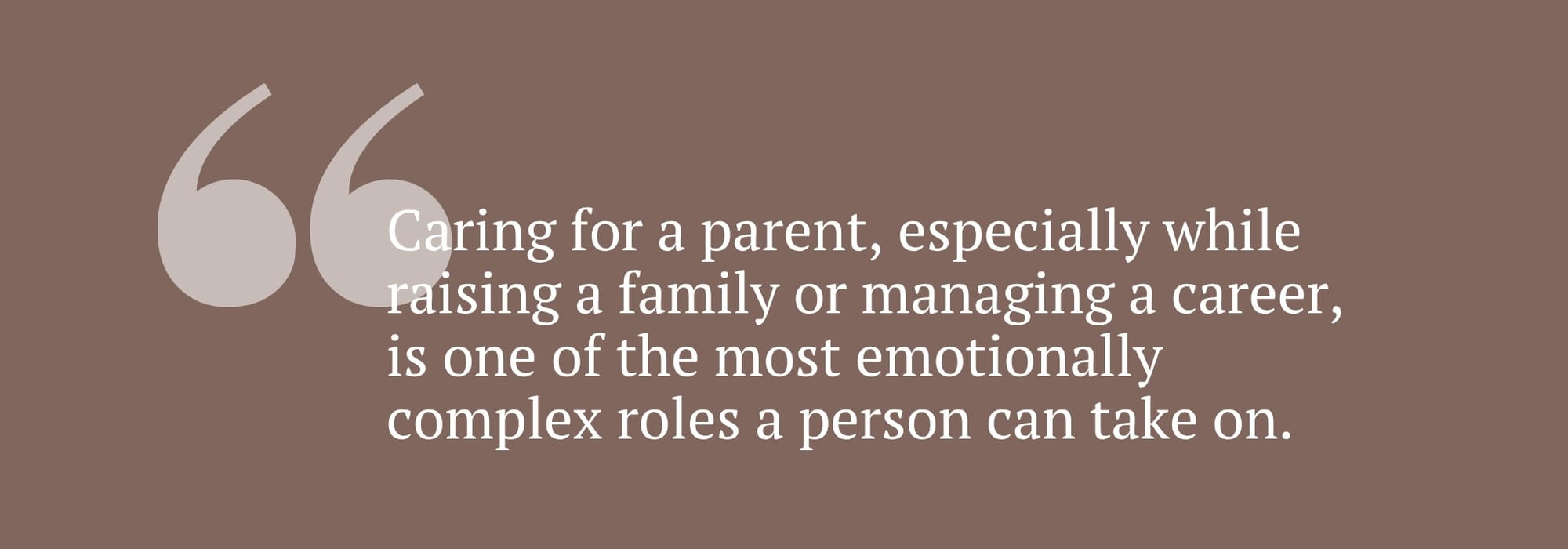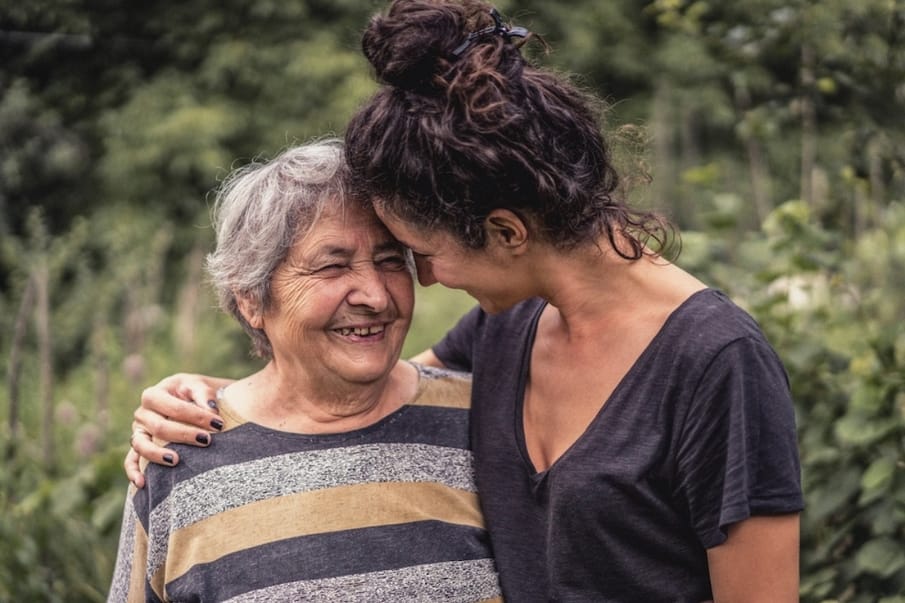Is your friend shouldering the weight of caregiving for an ageing parent? If so, they may be feeling lonely, frustrated, or stretched too thin. Here, we look at the everyday struggles of providing care, and how you can lend a hand
Caring can look like a natural reciprocity of a relationship – whether that’s tending to a friend who’s laid up with the flu, or a partner who has put their back out. But some of us – women, especially – face one-sided and, sometimes, exhausting caregiving demands when we take on the responsibility of an elderly parent’s health and wellbeing.
Looking after elderly parents is an uphill climb, carrying emotional, and physical, costs for the carer, such as burnout, anxiety, sleep issues, and even a loss of self. And on top of all that, this life-altering job is one that’s often unpaid.
Who cares?
The Office for National Statistics revealed there were 5.8 million unpaid carers in the UK, with women being more likely to provide care, according to the 2021 Census. Among the carers who were surveyed, 3 million were working in paid employment while managing the responsibilities of caregiving.
What’s more, the Family Resources Survey for the financial year 2023 to 2024 noted that the primary group of people receiving care were parents living outside the home. The same survey also found that 18% of carers in the UK were ‘sandwich carers’, meaning they were looking after a dependent child within their household while providing informal care to an adult relative, who, as we know, is often a parent.
So, your friend may find themselves caregiving in the thick of ongoing work, or parenting commitments (or both!), feeling like they’re running on empty.
No longer the same
“When a friend begins caring for an elderly parent, it can reshape their life quietly, but profoundly,” says counsellor Debbie Crew, highlighting the day-to-day difficulties of caregiving. “You might notice them cancelling plans more often, seeming distracted, or emotionally withdrawn. Beneath the surface, they may be juggling hospital visits, difficult conversations, and the growing fear that things are changing much faster than they can manage.”
Debbie breaks down the difficult reality of caring for elderly parents, including the emotional tapestry of experiencing something so momentous. “Caring for a parent, especially while raising a family or managing a career, is one of the most emotionally complex roles a person can take on. It often brings up guilt, grief, and exhaustion. Because it creeps in slowly, many people don’t realise how overwhelmed they are until something breaks.”

Your friend may feel confused as those familiar boundaries between parent and child begin to dissolve. Parenting the parent, or at least seeing them as vulnerable, may lead to feelings of uncertainty, or loss, as your friend questions where they now stand in that shifting relationship.
A friend of mine, Faye, who cares for her mum with Alzheimer’s disease and Lewy body dementia, describes this process: “It’s the weight of pretending you’re coping when, inside, you’re grieving the slow loss of the person they used to be. It’s one of the most loving things I’ll ever do, but it’s also one of the hardest, too.”
Additionally, your friend may feel some resentment or frustration as a result of putting plans on hold, or missing out on important occasions. The cared-for parent can also feel resentful about receiving care, adding another obstacle to this challenging situation, which can be heightened again if their relationship has been strained or distant in the past.
And let’s not forget about the potential financial fallout from looking after ageing parents, including direct elderly care costs, and lost income due to reduced working hours.
It’s no wonder that findings from a 2019 YouGov survey showed that 72% of unpaid carers felt that more help, especially emotional support, was needed. So, what are some steps you can take to stand by your friend in difficult times?
Be in their corner
Debbie states the importance of simply being there. “Your presence is the most powerful thing you can offer,” she says. “Don’t worry about saying the perfect thing. Just letting them know that you are thinking of them can be a valuable lifeline.”
When your friend opens up, Debbie suggests giving them space to be heard and express themselves fully, without providing solutions or comparisons. Try to avoid any ‘at least’ comments, as they can be unintentionally invalidating.
Some carers, however, find talking tricky, especially if there’s a family system of keeping quiet about their relationship dynamics outside the house, or, as in Faye’s case, they’re simply exhausted.
“Sometimes I might go quiet. It’s not because I don’t care, it’s because I’m tired in a way that’s hard to describe. In those moments, a simple ‘thinking of you’ text can make all the difference, reminding me that I’m still seen,” Faye says.
As Debbie emphasises, being a consistent presence can mean the world. “Supporting a friend in this position doesn’t require grand gestures. Steady kindness, quiet understanding, and practical help can go a long way.”

She outlines valuable practical guidance, including directing them to organisations like Age UK or Carers UK, and offering assistance with that initial, daunting phone call, as well as some concrete actions to make a difference to their wellbeing.
“Instead of vague offers, try to suggest something specific. Can you drop off a meal, help with a lift, or sit with their parent for an hour? Carers often won’t ask for help. Because they don’t know what to ask for, or feel guilty accepting it,” Debbie points out.
You can’t pour from an empty cup
Feeling guilty, especially when it comes to asking for help or taking time out, is something many carers struggle with emotionally. When my nan was diagnosed with dementia, my mum took on many of the caring responsibilities, putting her own needs aside while she felt she had to be the ‘strong’ one. But she said it was her friends who kept her going. So, know that reminding your loved one to nourish themselves can ease the pressure.
As a carer, mother of three, and full-time worker, Faye reiterates the need to pause. “I need space to talk beyond my caring role. To laugh, vent, and be silly helps me feel like me again. Even short, light-hearted conversations can pull me out of the fog.”
Helping your friend carve out space to engage in fun moments, or prioritise self-care, can re-awaken who they were before.“A walk, a coffee, or a shared laugh might not fix everything, but it reminds them of who they are beyond their caring role,” Debbie says.


Comments